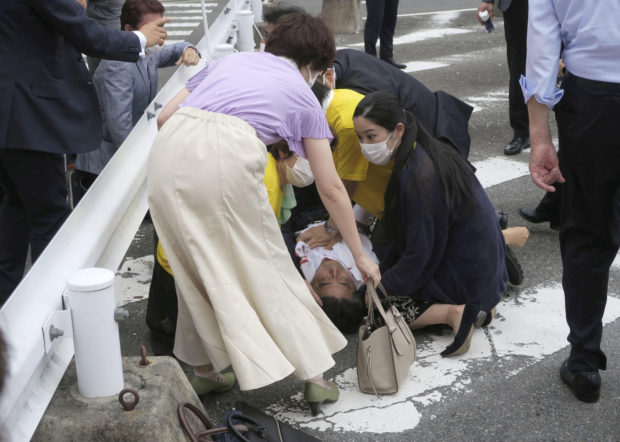Former Japanese premier Shinzo Abe shot, says gov’t spokesperson

TOKYO — Former Japanese prime minister Shinzo Abe was shot Friday morning in the prefecture of Nara, chief cabinet secretary Hirokazu Matsuno said.
“Former prime minister Abe’s condition is not currently known, and we are checking the situation,” Matsuno told reporters at an emergency news briefing at the prime minister’s office.
He said the former premier was shot at about 11:30 a.m.
Authorities have arrested one man who appeared to have shot Abe, 67, in the back.
Public broadcaster NHK earlier reported that Abe was taken to hospital on Friday after being shot from behind by what appeared to be a man with a shotgun while delivering a speech in the western city of Nara.
Article continues after this advertisementAbe appeared to be in a state of cardiac arrest, the network said and Kyodo news agency. Shots were heard and a white puff of smoke was seen as Abe made a campaign stump speech outside a train station, NHK said.
Article continues after this advertisement
Former Japanese prime minister Shinzo Abe lies on the ground after apparent shooting during an election campaign for the July 10, 2022 Upper House election, in Nara, western Japan July 8, 2022. in this photo taken by Kyodo. Mandatory credit Kyodo via REUTERS
READ: Japan ex-PM Abe feared dead; man nabbed for attempted murder
An NHK reporter on the scene said they could hear two consecutive bangs during Abe’s speech.
Abe served two terms as prime minister to become Japan’s longest-serving premier before stepping down in 2020 citing ill health.
READ: Japanese Prime Minister Abe resigns over worsening health
But he has remained a dominant presence over the ruling Liberal Democratic party (LDP) party, controlling one of its major factions.
His protege, Prime Minister Fumio Kishida, faces an upper house election on Sunday in which analysts say he hopes to emerge from Abe’s shadow and define his premiership.
Abe has been best known for his signature “Abenomics” policy that featured bold monetary easing and fiscal spending.
He also bolstered defense spending after years of declines and expanded the military’s ability to project power abroad.
In a historic shift in 2014, his government reinterpreted the postwar, pacifist constitution to allow troops to fight overseas for the first time since World War Two.
The following year, legislation ended a ban on exercising the right of collective self-defense, or defending a friendly country under attack.
Abe, however, did not achieve his long-held goal of revising the U.S.-drafted constitution by writing the Self-Defense Forces, as Japan’s military is known, into the pacifist Article 9.
He was instrumental in winning the 2020 Olympics for Tokyo, cherishing a wish to preside over the Games, which were postponed by a year to 2021 because of the COVID-19 pandemic.
Abe first took office in 2006 as Japan’s youngest prime minister since World War Two. After a year plagued by political scandals, voter outrage at lost pension records, and an election drubbing for his ruling party, Abe quit citing ill health.
He became prime minister again in 2012.
Abe hails from a wealthy political family that included a foreign minister father and a great-uncle who served as premier.

RELATED STORIES